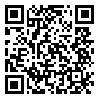1- Science and Arts University
Abstract: (804 Views)
Background & Objective: One of the most common mental disorders in the world today is depression. Depressive disorder is characterized by sadness, loss of interest or pleasure, feelings of guilt or worthlessness, sleep or appetite disturbances, fatigue, and poor concentration, with five or more of these symptoms persisting for at least two weeks. There is an association between depressive disorder and obsessive-compulsive symptoms, which is due to the existence of an emotionally based disorder. it can be said that their main similarity is an internal anxiety and tension that manifests itself in the form of avoidance, experiences of unwanted intrusive thoughts, intense worries, and an inability to control and contain worrying topics. Considering the significant prevalence of depressive disorder in the country, as well as its close relationship with obsessive-compulsive symptoms in these individuals, and despite many studies that have been conducted to investigate the effects of repetitive magnetic stimulation therapy (rTMS) on depressive disorder, no study has been conducted in the world on the role of this treatment on obsessive-compulsive symptoms in patients with depression, therefore, this study was conducted with the aim of investigating the effectiveness of Repeated Transcranial Magnetic Stimulation on the symptoms of obsessive-compulsive in adults with depressive disorder.
Methods: This research was a semi-experimental type with a pre-test and post-test design with a control group. Among adults with depressive disorder referred to the psychology clinics of Yazd city, 30 qualified volunteers were included in the study with the available sampling method, 15 of them were randomly assigned to the intervention group and 15 to the control group. obsessive-compulsive symptoms variable scores were compared using of the Obsessive Compulsive Questionnaire (Maudsley,1977) at two time points before and after Repeated Transcranial Magnetic Stimulation. Data analysis was done using SPSS version 23 software and covariance analysis. The significance level of the tests was 0.05.
Results: Data analysis showed that the score of the obsessive compulsive questionnaire in adults with depressive disorder in the intervention group and after receiving Repeated Transcranial Magnetic Stimulation decreased significantly compared to the control group (P<0.001). Based on the results of the effect size, 0/73 % of the difference between the intervention group and the control group in the changes in the obsessive-compulsive symptom variable was due to Repetitive Transcranial Magnetic Stimulation.
Conclusion: Repetitive Transcranial Magnetic Stimulation on the right dorsolateral prefrontal cortex reduces symptoms of obsessive-compulsive. In explaining this finding, it can be argued that in obsessive-compulsive disorder, the right dorsolateral prefrontal cortex is overactive, which in Repetitive Transcranial Magnetic Stimulation on the right dorsolateral prefrontal cortex has an inhibitory effect, causing a decrease in activity in this area of the brain, which reduces the symptoms of obsessive-compulsive in the individual. Also, according to the results of the research, since in obsessive-compulsive disorder we are faced with a decrease in the neurotransmitters dopamine and serotonin, Repetitive Transcranial Magnetic Stimulation, in addition to regulating brain activity patterns, controls the secretion of the neurotransmitters serotonin and dopamine, which helps reduce the symptoms of obsessive-compulsive disorder in the individual. The results of the present study showed that 10 sessions of 20 minutes of Repetitive Transcranial Magnetic Stimulation on the the right dorsolateral prefrontal cortex has a significant effect on the obsessive-compulsive symptoms in adults with depressive disorder and can lead to the improvement of obsessive-compulsive symptoms in these patients.
Methods: This research was a semi-experimental type with a pre-test and post-test design with a control group. Among adults with depressive disorder referred to the psychology clinics of Yazd city, 30 qualified volunteers were included in the study with the available sampling method, 15 of them were randomly assigned to the intervention group and 15 to the control group. obsessive-compulsive symptoms variable scores were compared using of the Obsessive Compulsive Questionnaire (Maudsley,1977) at two time points before and after Repeated Transcranial Magnetic Stimulation. Data analysis was done using SPSS version 23 software and covariance analysis. The significance level of the tests was 0.05.
Results: Data analysis showed that the score of the obsessive compulsive questionnaire in adults with depressive disorder in the intervention group and after receiving Repeated Transcranial Magnetic Stimulation decreased significantly compared to the control group (P<0.001). Based on the results of the effect size, 0/73 % of the difference between the intervention group and the control group in the changes in the obsessive-compulsive symptom variable was due to Repetitive Transcranial Magnetic Stimulation.
Conclusion: Repetitive Transcranial Magnetic Stimulation on the right dorsolateral prefrontal cortex reduces symptoms of obsessive-compulsive. In explaining this finding, it can be argued that in obsessive-compulsive disorder, the right dorsolateral prefrontal cortex is overactive, which in Repetitive Transcranial Magnetic Stimulation on the right dorsolateral prefrontal cortex has an inhibitory effect, causing a decrease in activity in this area of the brain, which reduces the symptoms of obsessive-compulsive in the individual. Also, according to the results of the research, since in obsessive-compulsive disorder we are faced with a decrease in the neurotransmitters dopamine and serotonin, Repetitive Transcranial Magnetic Stimulation, in addition to regulating brain activity patterns, controls the secretion of the neurotransmitters serotonin and dopamine, which helps reduce the symptoms of obsessive-compulsive disorder in the individual. The results of the present study showed that 10 sessions of 20 minutes of Repetitive Transcranial Magnetic Stimulation on the the right dorsolateral prefrontal cortex has a significant effect on the obsessive-compulsive symptoms in adults with depressive disorder and can lead to the improvement of obsessive-compulsive symptoms in these patients.
Keywords: Repetitive Transcranial Magnetic Stimulation, obsession compolsive symptoms, depressive disorder
Type of Study: Original Research Article |
Subject:
Psychology
Send email to the article author
| Rights and permissions | |
 |
This work is licensed under a Creative Commons Attribution-NonCommercial 4.0 International License. |



